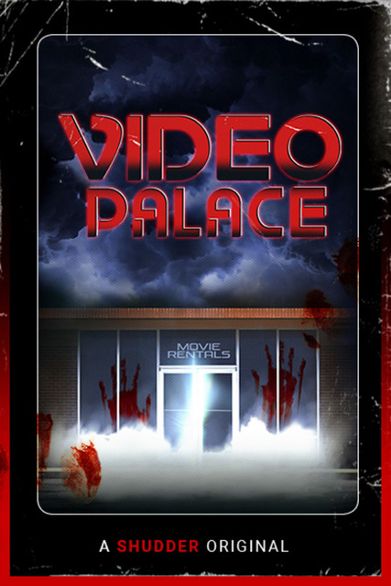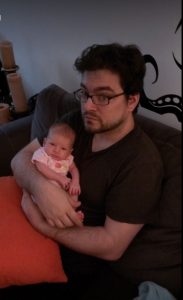We’re fortunate enough to have co-creators Nick Braccia and Mike Monello with us to discuss Video Palace and the process on seeing it go from concept to ’cast.
Hellnotes: First off, congratulations on Video Palace! Having a successful podcast is an awesome accomplishment, and having one that is a Shudder original is even more so. While my thoughts in my upcoming review should make clear that I really liked it and encourage everyone to listen to it, for our readers who haven’t before heard of Video Palace, could you tell us a little bit about it? What’s it about, and what can listeners expect?
Nick Braccia: Video Palace is a fictional, investigative podcast where a NYC couple—Mark and Tamra—explore the legend and lore of a mysterious Vermont video store and a white VHS tape. Watching this bizarre video affects Mark’s behavior and he’s compelled to dig deeper and discover the tape’s origin.
Mike Monello: Listeners can expect a fast-paced mystery that straddles the line between reality and fiction.
HN: Now that we know what Video Palace is about, could you take us back to the spark of inspiration for this series? How did you come up with the idea and what was it like developing it with each other? Were there any particularly inspirational podcasts (or movies or books) that you drew from? What did you want to do differently?
NB: I love this question. The genesis of the idea started a while ago. I had an experience where I re-visited an episode of Amazing Stories that I loved as a child. It’s called “Gather Ye Acorns” and stars Mark Hamill. As a 10-year-old kid, I thought it was the greatest. It’s set in the 1930s and Hamill plays a young man obsessed with toys and collectibles. His parents push against it, but he meets a troll who encourages his habit, his desire to hoard his “treasures.” By the end of the episode, the troll’s proven right and an elderly Hamill makes a mint from his collection. In 1986 I probably had a dozen Mark Hamill-shaped toys in my house—the episode was heaven. But watching it again in my 40s, I thought it had a really childish point-of-view. And it provoked an interest in exploring the collector/enthusiast bug (which I certainly possess) from the opposite perspective as “Gather Ye Acorns.” That the bug is a burden, not a boon. Not completely fresh territory, but in a supreme age of Comic conventions, Funko Dolls, and limited-edition vinyl, it seemed like the right time. For influences, there are tons. To paraphrase the late writer Dan O’Bannon talking about Alien, “We didn’t steal from anybody. We stole from everybody!” There’s the Polanski black comedy, The Ninth Gate and the menacing John Carpenter episode of Masters of Horror called “Cigarette Burns.” Certainly Serial and S-Town informed the pace. It’s also hugely important to note that, while these works inspired the story, Ben Rock, our writer/director, and Bob DeRosa, our co-writer, took our ten-page story document and brought their own influences and flavors, which includes lots of stuff, some of which I still need to see, like Stuart Gordon’s From Beyond.
MM: I’ve been listening to podcasts since the beginning, and I avidly follow how the medium shapes stories and shows over time. When Serial hit, suddenly there was cultural cache and a reasonable amount of investment into the space. It started to feel a lot like the independent film scene in the late 1990s, where there was infrastructure, audience, and opportunity. I really had the itch to do a scripted fiction podcast when earlier this year we heard Shudder was looking for originals.
Nick and I have been collaborating on creative projects for years in our day-to-day work at Campfire (http://www.campfirenyc.com), so it was really easy to go from opportunity to pitch document to the story document.
HN: Video Palace is a podcast, but a lot of our readers may not fully appreciate what that means in terms of how many people were involved in bringing it to life. You were the co-creators, but then there were producers, writers, actors, and others who were involved in taking your idea to the final podcast form. Could you talk a little bit about what that process was like for you? In particular, what was it like seeing your idea change as more and more people got involved?
MM: Ben Rock and I have been friends for decades, we both were involved in The Blair Witch Project, and we’d been talking about doing a podcast for a while, so when he agreed to come onboard everything else fell into place very quickly. Ben brought in Bob DeRosa, his partner on the web series 20 Seconds to Live (http://www.20secondstolive.com), as co-writer and our Producer, Liam Finn. The three of them were like The Avengers, individually amazing but as a group they just killed it. We knew the story outline had some holes and problems to solve but overall I was thrilled with their solutions. Their scripts were so good they were a joy to read and our notes were generally minor. The show edits were so tight we were mostly just giving fine tuning notes on the first drafts, which is remarkable. Producers don’t often get enough love when people talk about creative work, but Liam took a tight budget and knew exactly where to put the dollars to make it sound like a million bucks.
And I can’t say enough about how supportive Owen Shiflett and Nick Lazo at Shudder were. Their notes were sharp and and on point, and really Video Palace would not exist without them.
NB: Oh man, it was great seeing the idea change. Kill those darlings! Our team included Ben, Bob, and Liam plus post-supervisor, Mark Stolaroff, a robust cast of over 20 performers, composer Mike Teoli, a great sound house, and our terrific casting director, Leah Mangum. Bob and Ben (who are in LA) did a corkboard & notecards session with me via Skype to lock in the story beats for each episode and from that foundation, everyone contributed to the story and texture of Video Palace. Reading and giving script notes was especially interesting because Ben—rightly—believed that giving actors bullet points to hit (rather that exact dialogue) would yield more the kind of authentic performances we wanted. So we’d review the pages for possibility rather than prose. Would the pages be an ample springboard for the talent? What is essential plot that needs to be on the page versus what can be improvised? Those are the questions we considered. It’s also worth noting, this all happened fast. We had less than two weeks to produce 185 pages of script and I think about a week in-studio with talent. Some of our key performers were just in for the day. Ben did everything to make sure the environment for the recording would yield the best material possible. I’m used to working on projects where I have to make a lot of on-the-fly decisions quickly in the heat of production. In that way, it was great to executive produce Video Palace and receive scripts and edits ready for feedback. It was like getting gifts in the inbox each day, where people made our initial ideas better.
HN: Video Palace is, at its heart, a “forbidden tome” story—there is a text (here, a video tape) that was created under mysterious circumstances and holds forbidden knowledge; yet despite all the sinister events that surround it, our protagonist finds its allure inescapable. In Video Palace, our host Mark Cambria keeps pressing on to unlock the mystery of the White Tapes, even as the obstacles and personal costs keep rising. What is it about the “forbidden tome” story that has such an undeniable hook in our hearts?
MM: There’s that famous TED talk where JJ Abrams describes his storytelling as a mystery box that he never opens. To me, there is no story until you open that damn box and unleash whatever is inside. You have no idea what you unleashed, but finding out is the exciting and scary part, that’s why the story starts after he watches the tape.
NB: Pandora’s Box. The Ark of the Covenant. Necronomicon. Humans just can’t leave well enough alone, right? I think the theme behind the trope is simply desire for knowledge and power. But I think the voracious collector is little bit different, psychologically, than the ark hunter. I think the collector becomes obsessed with objects they perceive as substantial or meaningful. They act as if the objects they covet have inherent worth, but the value is subjective. And it’s like a bug or disease that comes in different strains: baseball cards, shoes, Pokemon. No spoiler here, but one of my favorite moments in the podcast is a little throwaway line when Mark judges Bets Mueller for being a hoarder because she has stacks of newspaper in her dirty New Hampshire house. He completely misses the irony that his tiny NYC apartment is filled with VHS copies of C.H.U.D. Somebody once said to me that the difference between hoarder and collector is a class distinction. I don’t think that’s 100% accurate, but I don’t think it’s 100% inaccurate either.
HN: Along those lines, Video Palace involves a physical text in the White Tapes, but even tapes from the 1990s already seem anachronistic in 2018. Do you think that as society moves further away from fixed media and into downloads, streaming, and other transitory, non-fixed experiences of media that the “forbidden tome” will hold its appeal? Is there something else that might arise, or do you think books and tapes and other physical records will always have a place in the popular conscious (even if what that place is changes)?
NB: It’s an ancient trope, which will exist as long as we do. There will always be artists like David Cronenberg or Olivier Assayas to push the core idea into new realms. And there will always be stories where an object arcana is plucked from humanity’s fossil record and unleashes terrible happenings. It’s too much fun to give up. At the same time, we’ve seen plenty of stories in the last quarter century that explore streaming media, technology perils or code as metaphor whether Lawnmower Man, The Matrix, or Unfriended.
MM: The more mediated our lives become by digital technology, the more we crave physical experiences. There are more record stores in my neighborhood today than there was 10 years ago, so I think the allure of physical media will always have some limited appeal, particularly to collectors. When I moved to NYC from Florida 10 years ago, I decided to set up my long-forgotten record player. My two kids, who were 5 and 3 at the time, saw me connecting the record player and asked me what it was. I explained how a record works and pulled out a copy of Prince’s Purple Rain to demonstrate. As soon as I dropped the needle on “Let’s Go Crazy” and that first note hit, they had a look on their faces like I had just performed some kind of sorcery. Then the song kicked in and they danced until it finished and screamed “do it again!” They had only known music as this ephemeral digital thing that just came out of speakers and the idea that it could be contained on a physical object was magical to them. So I think physical media will always hold some mystery and allure for us, even though our relationship to it has changed radically.
HN: When you were coming up with the idea, how did you settle on videotapes as the focal objects? Were there particular challenges that you faced when deciding to make an audio-only story about an audio-visual medium? Was there something about collectors and the drive to collect videotapes in particular that you were drawn to?
NB: While we’ve been developing the collector theme for a while, the video tape focal point came specifically from wanting to pitch Shudder and appeal to their audience, who have a huge love for the heyday of VHS horror. And yes, an audio-only story about an audio-visual medium is tricky. We had to be very careful about how specifically we described the tapes. We wanted to be evocative, but not so elaborate that it was a point of frustration for listeners who couldn’t see the tapes. When we initially conceived the project, we wanted to make the tapes, but from a cost perspective, making them the way we envisioned them (like Kenneth Anger shooting in PixelVision) was just too prohibitive.
MM: We talked a lot about the irony of telling an audio-based story about a visual format. It was really a directing and sound editing feat to give people just enough to imagine what is on those tapes without making you feel like you were missing anything.
HN: Without going into spoilers, Video Palace ends in a way that could allow for further development of the White Tapes, either with these character or with new ones. While I’m all for open-ended stories, I would be remiss if I didn’t ask whether or not there were any plans for a second season, so … are there?
MM: From the beginning we wanted to tell stories about the white tapes in several forms of media. The story of Mark and Tamara was developed specifically for the podcast format and we have ideas for what comes next in their story but there are also opportunities to tell different White Tape stories in serialized video or feature film format that we would love to explore.
NB: I would love to see it adapted into a TV series or movie. As Mike alluded to, we developed a Video Palace mythology before we wrote Mark’s story. And Bob and Ben further built upon that in the scripting process. What the audience learns in the first season of the podcast is just the very beginning of what’s possible in this world. We know how important individual stories are, but Mike and I also think in terms of narrative platforms, which comes from our work with entertainment franchises. It’s just auto-programmed into our heads at this point.
HN: Finally, what’s next on the horizon for you, either individually or together? Has being involved in a podcast like Video Palace made you more interested in pursuing any particular kinds of projects or other forms of media going forward?
NB: We continue to work together at Campfire. While we were deep in production on Video Palace, we were also creating Purge City for USA Network at San Diego ComicCon. In a way, our Campfire work helped inform our approach to audio, since we’d developed audio-centric programs for the shows Outcast, Vikings, and The Man in the High Castle. I absolutely love working in audio, but part of our professional DNA is the impulse to examine audience behavior and emerging media formats, searching for both canvas and opportunity.
MM: We are actively developing other stories, in audio form as well as video. I’m excited by all kinds of storytelling, whether video, audio, or experiential like we sometimes do at Campfire. What excites me most is using each of those to tell stories in truly unique ways that take advantage of the unique properties of each format.
Michael Monello is a true pioneer when it comes to immersive storytelling. In the late 1990s, Monello and his partners at Haxan Films created The Blair Witch Project, a story told across the burgeoning internet, a sci-fi channel pseudo-documentary, books, comics, games, and a feature film, which became a pop-culture touchstone and inspired legions of “found-footage” movies in its wake. Monello co-founded Campfire in 2006. There, he leads a company that has created groundbreaking participatory stories and experiences for True Blood, Game of Thrones, The Purge, The Man in the High Castle, Westworld, and more. Monello is a member of the Producer’s Guild of America.
Website: http://www.campfirenyc.com
Twitter: https://twitter.com/mikemonello
Nick Braccia is an award-winning producer, writer, and director. A committed horror, fantasy, and sci-fi buff, Braccia has written and directed narrative extensions for Robert Kirkman’s Outcast, From Dusk Till Dawn, and the video game franchises Dead Space and Dante’s Inferno. For four years, he was the host of the popular podcast, Transmedia Talk, which focused on emerging storytelling formats. Braccia has been part of the Campfire team for six years, and has recently co-written immersive experiences set in the worlds of The Man in the High Castle, Westworld, and The Purge. Braccia is a member of the Producers Guild of America.
Work: https://www.bracciacreative.work/
Linkedin: https://www.linkedin.com/in/nick-braccia-736bb8/
Facebook: https://www.facebook.com/nbraccia
Twitter: https://twitter.com/nickbraccia











